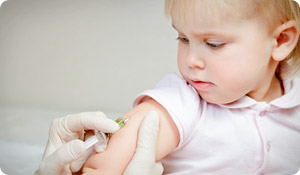
In 1995, the Food and Drug Administration approved a vaccination for chicken pox. Before then, chicken pox was an almost universal childhood illness, uncomfortable but generally not severe. Recovering from childhood chicken pox helps people develop natural immunity against developing shingles (a related illness) as adults.
Parents must evaluate whether the chicken pox vaccine makes sense for their children.
According to the Centers for Disease Control and Prevention (CDC), before the vaccine, if 1,000 people had chicken pox, an average of 100 would require medical attention, two would be hospitalized, 50 would develop infected blisters, and roughly 50 children per year would die.
In 1992, for example, about 158,000 people had chicken pox and 100 (mostly adults) died. According to the National Vaccine Information Center (NVIC), a nonprofit founded by parents of vaccine-injured children, most people who develop severe complications from chicken pox have compromised immune systems or other health problems.
Chicken pox vaccine
The CDC recommends children get the chicken pox vaccination between 12 and 15 months, followed by a booster dose at 4 to 6 years. For every 1,000 individuals who receive the vaccination, the CDC estimates:
- 700 to 900 will never get chicken pox,
- 100 to 300 will have a less severe case,
- Fewer than 50 will have a mild rash up to a month after immunization,
- 100 to 200 will develop a fever, and
- About one will have a seizure related to the fever.
Sometimes, remnants of the chicken pox virus remains in nerve cells and reactivates in adults—usually older adults and those with compromised immune systems-causing shingles, a non-contagious disease with painful bands of blisters. The CDC recommends adults 60 and older get the shingles vaccine, which is only licensed for adults 50 and older.
The NVIC believes the chicken pox vaccine has lessened individuals' ability to develop natural immunity from the virus and has increased the incidence of adult shingles. Similarly, the Health Protection Agency in the United Kingdom reports that implementing the chicken pox vaccine decreased chicken pox in children, but increased shingles incidence by 20 percent.
In contrast to the CDC, the NVIC does not recommend the chicken pox vaccine because it only provides temporary immunity and leaves children vulnerable to shingles or more severe cases of chicken pox as adults. Furthermore, it says the Vaccine Adverse Events Reporting System reports that between March 1995 and July 1998, about one in 1,481 vaccinations resulted in mild to severe health problems, including 14 deaths.
Sources:
Steckelberg, James M., M.D. "Singles Vaccine: Should I get it?" Mayo Clinic. Web. 11 January 2012.
http://www.mayoclinic.com/health/shingles-vaccine/AN01738
Mayo Clinic. "Chickenpox." Web. 3 September 2010.
http://www.mayoclinic.com/health/chickenpox/DS00053
Centers for Disease Control. "Chickenpox (Varicella)." Web. January 2012.
http://www.cdc.gov/vaccines/vpd-vac/varicella/default.htm
National Vaccine Information Center. "Herpes Zoster (Shingles) & Shingles Vaccine."
http://www.nvic.org/vaccines-and-diseases/Shingles.aspx
National Vaccine Information Center. "Chickenpox." Web.
http://www.nvic.org/vaccines-and-diseases/Chickenpox/chickenpoxfacts.aspx





